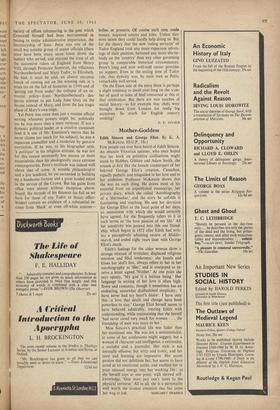Mother-Goddess
Edith Simcox and George Eliot. By K. A. McKenzie. (O.U.P., 18s.) FEW people can ever have heard of Edith Simcox. An obscure Victorian spinster, who once hoped that her book on primitive civilisations might stand by Hobbes, Gibbon and Adam Smith, she sounds at first like the female counterpart of her beloved George Eliot's creation, Casaubon, equally pathetic and misguided in her love and in her ambition. Professor McKenzie shows that she was no such thing. He draws most of his material from an unpublished manuscript, her private diary, which she called 'Autobiography of a Shirtmaker,' and the story he unfolds is fascinating and touching. He sees her devotion for George Eliot as the focal point of her days, an assessment with which she would certainly have agreed, for she frequently refers to it in such terms as 'the love passion of my life.' All her sensitivity was poured into this one friend- ship, which began in 1872 after Edith had writ- tea a perceptively admiring review of Middle- march, and ended eight years later with George Eliot's death.
Edith's feelings for the older woman show a strange mixture of eroticism, displaced religious emotion and filial tenderness: she kneels and kisses her idol's feet, always refers to her in her autobiography as 'Her,' and is overjoyed to re- ceive a letter signed 'Mother.' At one point she says openly, 'My god is a human being.' Her language in writing of her love is often high- flown and romantic, though it sometimes has an endearing, somewhat disillusioned simplicity: 'I have never had my heart's desire: I have only this—a love that death and change have been powerless to stay.' George Eliot herself seems to have behaved admirably, treating Edith with understanding, while maintaining that she herself 'had never cared very much for women . . . the friendship of men was more to her.'
Miss Simcox's practical life was fuller than her emotional one. She was not a sentimentalist, as some of her confessions might suggest, but a woman of character and intelligence, a rationalist, a socialist and a journalist. Her style is not normally effusive, but witty and ironic, and her taste and learning are impressive. Her secret passion did not debilitate her, but seems to have acted as an emotional outlet, and enabled her to pour unusual energy into her working life: as
she herself says at one point, with shrewd self-
knowledge, 'One must pay one's taxes to the physical universe.' All in all, she is a personality well ,worth the modest attention that has come


































 Previous page
Previous page